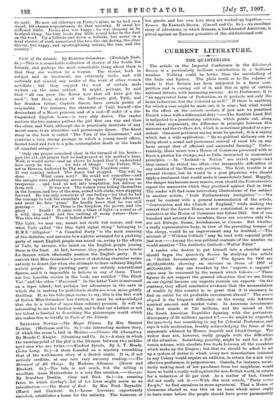Islands, and perhaps the most remarkable thing about them is
that they are written by a woman. The stories, both in subject and in treatment, are extremely virile, and will certainly not remind any reader of the work of other women novelists ; but they suggest the work of certain male writers on the same subject. It might, perhaps, be said that "all can grow the flower now that all have got the seed "; but these stories of the half-caste girl, Vaiti, and her drunken father, Captain Saxon, have certain points of -originality. For instance, the character of Vaiti herself—the descendant of a Maori princess, and of a cast-off cadet of a dis- tinguished English house—is very ably drawn. The reader realises the two natures pulling the girl first one way and then the other, and Vaiti, although she is practically destitute of any moral sense, is an attractive and picturesque figure. The finest story in tho book is called "The Fate of the Lieutenant," and contains a very strong passage in which a young naval officer, bound hand and foot to a pole, contemplates death at the hands of cannibal savages :— "Only one prayer remained clear in the turmoil of his brain— just the old, old prayer that he had prayed at his mother's knee. Well, it would serve—and up above he hoped they'd understand how sorry he was . . . . for lots of things. 'Our Father, Who art in Heaven, hallowed be Thy name. Thy Kingdom come It was coming indeed. The dance had stopped. 'Thy will be done . . . ' What came next ? He could not remember—and the savages were advancing across the square. 'Forgive us our trespasses . . and lead us not into temptation, but deliver us from evil . . . ' It was now. The women were hiding themselves in the houses, and two of the men, armed with clubs, were stepping forward. He was only conscious of one feeling—joy that he had the courage to look the cannibals in the face as they advanced, and meet his fate 'game.' He hardly knew that he was still praying— ` . . . For Thine is the kingdom, the power, and the glory . . ' Death ! It came with a blaze of light—a sound. as of a wild, deep shout and the rushing of many waters—then- Was this the end ? Was it indeed death ? "
The light, we may say, meant not death but rescue, and was what Vaiti called "the blue light signal thing" belonging to H.M.S. Alligator.' "A Cannibal Party" is the most amusing of the sketches; and narrates bow a picnic arranged for a yachting party of smart English people was seized on, owing to the efforts of Vaiti, by savages, who insist on the English people joining them in the feast. At last, however, they produce a bonne bouche for dessert which effectually scatters the English party. It is curious that Miss Grimshaw's power of sketching character seems entirely to desert her when she attempts to draw ordinary English society people. Her yachting party are entirely conventional figures, and it is impossible to believe in any of them. There are two horrible stories in the hook, one entitled "The Black Viri" and the other "Marooned." In the latter Vaiti is marooned on a leper island ; but perhaps her adventures in the cave in which she is seeking for prehistoric skulls are even more grimly thrilling. If, as the title-page seems to say, this is the first work of fiction Miss Grimsbaw has written, it must be acknowledged that she is a writer of more than ordinary promise. It will be interesting to see her further work, and to find out whether or not her talent is limited to describing the picturesque world which she makes live so vividly in Vaiti of the Islands.






































 Previous page
Previous page